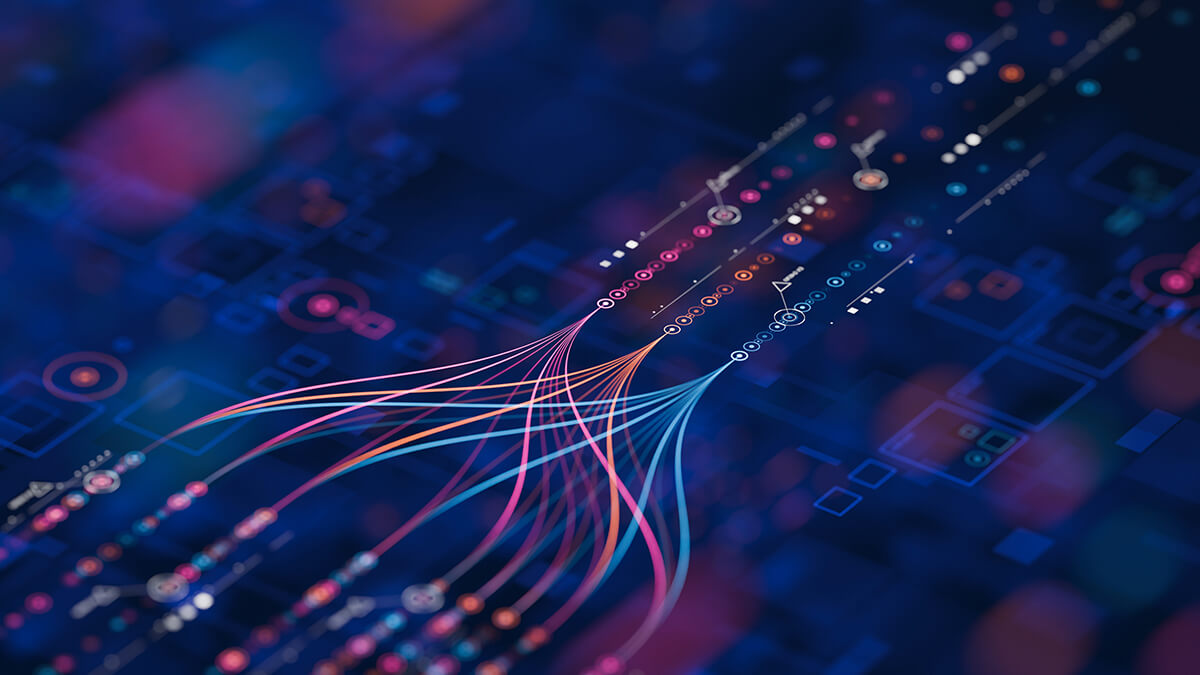In the fast-evolving landscape of technology, AI in mentoring software and solutions has emerged as a transformative force, reshaping the way we work, learn and connect. And while AI as it applies to machine learning has been around for quite a while, we’re largely talking about generative AI—things you’ve heard about like ChatGPT, Bard, AlphaCode and Bing AI.
In this article, we’re going to explore:
- the pros/cons of AI in mentoring
- how AI mentor matching is making what was old, new again
- trends in AI mentoring software
- what lies on the horizon
What Is Artificial Intelligence (AI) in Mentoring?
In essence, artificial intelligence (AI) will increasingly be used for coaching and mentoring as it replicates human intelligence in machines, enabling it to perform complex tasks and make data-driven decisions. AI has its roots in the field of computer science and has evolved over several decades:
- 1950s: Dartmouth conference coins “AI”
- 1990s: Machine learning breakthroughs
- 2023–24: Generative AI enters mentoring
AI for Mentoring & Coaching in the Workplace
In the workplace, AI is deployed across diverse functions, from automating routine tasks to optimizing decision-making processes. Automation tools powered by AI streamline workflows, handling repetitive and time-consuming tasks, enabling employees to focus on more strategic and creative aspects of their roles. Machine learning algorithms analyze vast datasets to provide predictive insights, aiding in forecasting trends, customer behaviors and market dynamics.
- In HR departments, AI facilitates more efficient recruitment processes, enhancing candidate matching and improving the overall employee experience.
- Virtual assistants powered by AI respond to queries, schedule appointments, can act as ai tools for coaching and mentoring and manage routine administrative tasks, contributing to increased productivity.
- AI-driven analytics contribute to data-driven decision-making, offering organizations a competitive edge by extracting actionable insights.
In the workplace, AI is disrupting operations by automating mundane tasks, providing insights through data analysis and enhancing people development. With the help of the right tool, such as AI mentoring software, organizations can also support manager-to-employee check-ins to make sure people are developing and feeling cared for.
AI in Academic Institutions
In academia, AI is contributing to personalized learning plans, streamlined communication and analytical insights. AI technologies are being harnessed to personalize the learning experience for students in the following ways:
- Personalized Learning PlansMachine learning algorithms analyze individual learning patterns, adapting educational content to cater to the unique needs and preferences of each student.
- Intelligent Tutoring Systems powered by AI provide real-time feedback and assistance, helping students grasp complex concepts at their own pace.
- Automated Admin AI handles administrative tasks, such as grading and scheduling, freeing educators up spend more time to teaching and mentoring.
The integration of AI in academic institutions underscores its potential to make it more adaptive, personalized and technologically advanced.
Discover how AI mentor matching increases student success rates
AI can analyze interests, goals, and academic data to connect students with the right mentors—fostering relationships that improve retention and achievement. For example, AI may pair first-generation college students with alumni who’ve navigated similar paths, or match STEM majors with industry professionals who can guide career readiness. These connections go beyond academics, helping students thrive both personally and professionally.
Navigating Bias and Privacy Using AI for Mentoring
While the integration of AI into mentoring holds promise, it is not without challenges. Two significant concerns are biases and privacy. Biases can infiltrate AI systems if they are trained on data that reflects existing inequalities. Privacy issues also arise, especially in educational settings where sensitive information is shared.
Bias in AI Mentor Matching
- Source data risk: AI systems can inadvertently perpetuate biases present in the training data, potentially impacting mentor-mentee relationships.
How do you ensure ethical AI mentor matching? AI systems learn from historical data, and if this data reflects existing biases or prejudices, the AI model may perpetuate those biases.
For example, if a machine learning model is trained on historical hiring data that reflects gender or racial biases, it may inadvertently reproduce those biases when making future hiring predictions.
Addressing biases in AI requires a comprehensive approach that involves diverse and inclusive data collection, careful algorithmic design, ongoing monitoring, and ethical considerations throughout the development lifecycle.
- Having a ‘human in the loop’ to work with, and adjust the AI outcomes if necessary, ensures fair and equitable outcomes in the mentoring process.
While scientists and developers attempt to weed out biases in AI, it’s important to stay aware of the possibilities and make sure it isn’t hindering your mentoring process.
Why chatbots cannot become successful mentors? Chatbots can provide quick answers and surface-level guidance, but they lack the empathy, lived experience and trust that define true mentorship. Successful mentors not only act as role models and advocates, but also connectors, roles AI cannot authentically fulfill. At best, chatbots can support mentoring, but they cannot replace the human-to-human connection that drives meaningful growth.
Privacy Concerns in AI Tools for Coaching and Mentoring
The use of AI in mentoring involves the collection and analysis of personal data, raising valid security and privacy concerns. AI systems often rely on vast amounts of data to train and improve their performance.
- Personal data handling
The collection of extensive personal data, including online activities, location information, and behavioral patterns, raises concerns about mass surveillance and the potential misuse of sensitive information. This combined with inadequate transparency regarding how AI systems handle personal data, make decisions and impact individuals’ privacy contributes to concerns.
- Transparency best practices
Clear and transparent policies are essential to building trust and ensuring responsible AI deployment. For something like a mentoring relationship (especially with students or participants under 18), it is important to secure private information and maintain confidentiality.
Top Advantages of Using AI in Mentoring
I know the factors mentioned above can make things in the world of AI seem a bit scary and perhaps a little like the wild, wild west. Despite the challenges though, the benefits of incorporating AI into mentoring are noteworthy. AI can offer personalized learning plans, streamline communication between mentors and mentees, and provide data-driven insights to enhance the overall mentoring experience.
- Effective Matching: AI mentor matching can analyze vast amounts of data to identify patterns and correlations between mentors and mentees. This allows for more accurate and effective matching.
- Personalized Learning Paths: AI tools for mentorship can assess the unique needs, strengths and weaknesses of each mentee. AI can create personalized learning paths that helps mentees receive guidance and resources aligned with their individual goals.
- Scalability: AI for mentoring can handle the complexities of managing a large number of mentor-mentee relationships by automating administrative tasks, providing insights, and ensuring a consistent experience.
- Data-Driven Insights: AI tools for mentorship can analyze data generated by mentoring programs to provide valuable insights. Mentoring benchmarks, for example, can showcase the program’s performance against others.
- Skill Development: AI-driven interactive programs can play a role in developing key skills for both mentors and mentees. These programs provide targeted practice, feedback, and guidance in areas such as critical thinking, problem-solving, and communication, enhancing the overall skill development of participants.
Leveraging AI Tools for Coaching
Artificial intelligence (AI) will increasingly be used for coaching and mentoring. Integrating AI in coaching brings about a myriad of benefits, fundamentally transforming the coaching landscape. AI’s capabilities provide:
- data-driven performance insights
- personalized feedback loops
- automation of routine tasks
- scalable coaching programs
Ultimately, the infusion of AI in coaching programs empowers individuals to navigate their personal and professional growth journeys with personalized guidance, efficiency, and evidence-based insights.
Chronus’ AI Mentor Matching & Guided Conversations
Chronus sees AI as a valuable ally in mentoring, but not as a replacement for the human touch. The platform has been using machine learning within its AI mentor matching for years to build more successful mentoring relationships within organizations. The platform has also used AI to highlight data analytics, build industry-leading Mentoring Benchmarks that measure customer performance against similar mentoring programs in their industry.
In the future, Chronus mentoring software envisions using AI to:
- provide better mentor/mentee recommendations
- deliver guided conversations and AI goal setting based on the mentoring relationship
- build guided mentoring agendas for coaching and mentoring
- personalize learning pathways and training modules that optimize AI mentoring software
All of this is being considered and developed with the understanding that AI is meant to enhance the human connection, not replace it. When choosing the best mentoring software for your business, consider that Chronus creates mentoring programs emphasizing the necessity of human oversight to maintain empathy and understanding in mentoring relationships.
Conclusion: Embracing AI for Human Mentoring Relationships
As we navigate the intersection of AI for mentoring, platforms like Chronus are leading the way in harnessing the power of technology while preserving the essence of human connection. The journey towards effective AI mentor matching involves a delicate balance, addressing biases, respecting privacy and ensuring that the human touch remains at the heart of the mentoring experience.
Key Takeaways
- AI enhances mentoring, but the human connect is irreplaceable
- Opportunities come with ethical responsibilities
- AI mentoring can offer automation, productivity and guidance
Through innovative approaches and a commitment to amplifying human connection, mentoring platforms are paving the way for a future where technology enhances, rather than diminishes, the profound impact of mentoring relationships.
FAQs
Here are frequently asked questions about artificial intelligence for mentorship programs.
1. What are the best AI tools for coaching and mentoring today?
The most effective AI tools for coaching and mentoring are those that streamline program management, provide data-driven insights, and support personalized development. Examples include AI mentor matching platforms like Chronus, which use machine learning to pair participants more effectively, and AI-enabled learning systems that offer guided conversations, goal tracking, and analytics to strengthen outcomes. These tools save time on administrative tasks and help scale programs without losing quality.
2. How does AI mentor matching improve program success?
AI mentor matching analyzes mentee and mentor data—such as skills, goals, interests, and career aspirations—to create more accurate and meaningful matches. This leads to better measurement and reporting, stronger relationships, higher engagement, and better outcomes like improved retention, employee development, or student success. By removing guesswork, AI ensures participants start their mentoring journey with a foundation for trust and alignment.
3. Can artificial intelligence (AI) be fully trusted for mentoring?
AI is a powerful ally in mentoring, but it should not be fully trusted to operate without human oversight. Risks such as bias in data, lack of transparency, and privacy concerns make it essential to keep a “human in the loop.” The best programs use AI to enhance efficiency and insights while ensuring mentors and program managers guide decisions with empathy and fairness.
4. Why are human mentors irreplaceable?
Human mentors bring empathy, lived experience, and authentic connection—qualities AI cannot replicate. Beyond providing advice, mentors serve as role models, advocates, and connectors, helping mentees navigate challenges in ways that go beyond data. While AI can support the process, the transformational impact of mentoring comes from human relationships that inspire growth, confidence, and purpose.




